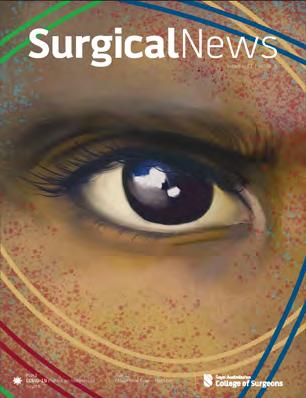
8 minute read
Vice President's perspective
Another year is rapidly coming to an end and despite the accompanying challenges and disruptions, I hope that you and your families are safe and well.
It is heartwarming to see Australia and Aotearoa New Zealand emerging from difficult circumstances and into a sense of normality as vaccination rates increase and a decrease in the severity of COVID-19 cases. I would like to highlight a few thoughts in this message to you. We recently conducted an evaluation of the short-term outcomes of the RACS Building Respect and Improving Patient Safety initiative. The evaluation focused on program governance and oversight, awareness of standards of respectful behaviour, and identifying program deficiencies. This would not have been possible without the contribution of our Fellows, Trainees and Specialist International Medical Graduates (SIMGs) whose insights will be invaluable in formulating the upcoming Action Plan. RACS extends its gratitude to all who contributed. The evaluation found that more than 90 per cent of members support our work in this area, the leadership role that RACS has taken and the commitment to improve the culture in the surgical workplace. This aligns with community awareness and expectations of the need to improve workplace behaviour, which is increasingly part of workplace policies. Almost all (99 per cent) Fellows, Trainees and Specialist International Medical Graduates (SIMGs) believe in the need to demonstrate respectful behaviours, and 96 per cent recognise the need to address unacceptable behaviour in colleagues and peers. However, there is a knowledge and behaviour gap as while knowledge of respectful behaviours is widespread, and attitudes are changing, ‘calling it out’ is a challenge for many. We recognise that behaviour change is a long-term goal, but many of us need more confidence to act when witnessing or experiencing poor behaviour. There is another extremely important relationship, that I would like to highlight: that of between Fellows and staff. Council has guided the evolving governance structures and it is important to explain the implications for Fellows and staff.
Advertisement
Your Board represents members and delegates the responsibility to progress board set strategic direction to board- related committees. Many committees are predominantly operational and are critically reliant upon the diligence, support, and high-level expertise of RACS staff. Our staff are the engine room of our strategy delivery, and my experience of board governance reflects the importance of the team in developing and maintaining relevance for our members, and more importantly to our community. A recently held workshop, facilitated by an industry expert external reviewer provided an update of appropriate governance of RACS, our roles and how to best add value.
Fellows must lead by example in acceptable standards of behaviour and interactions with Trainees, SIMGs, other healthcare workers and RACS staff. I have observed the lack of appreciation of power differentials that exist in these relationships and perhaps it is time to recognise the effect this has upon those with whom we interact. Being aware of nuances such as these is a sign of respect. I am saddened by reports of poor behaviour by Fellows towards staff, and we need to appreciate the negative impacts of this behaviour on their function and physical wellbeing. I highly commend College staff who, despite the difficulties imposed by the pandemic, have performed above expectations, for the benefit of the College. RACS staff are highly trained and qualified professionals, experts in their field and employed to progress College goals and aspirations. RACS staff are the ether for the College's success. We recently achieved the Department of Foreign Affairs and Trade (DFAT) basic accreditation and aim for full accreditation, which will create new funding opportunities. As we continue to meet the evolving regulations and standards of DFAT, we need to ensure compliance with DFAT and institutional donor requirements to attract funding for our growing programs in the Asia-Pacific region. A recent independently facilitated donor-mapping activity involved Fellows and staff as part of a strategy to grow programs and diversify funding sources. RACS has a highly skilled team with more than 100 years of development expertise, which we Fellows can harness for a brighter future. Together, we can make this happen. As we look into the future, it is increasingly important for RACS to explore surgeons’ growing interest in robotic assisted surgery with implications for training, standards and accreditation. Surgery delivery is changing as are the barriers to adoption of robots such as cost and availability. I have little doubt that in the future, Trainees and surgeons will become increasingly technology dependent. RACS has a responsibility to develop our members with the necessary skill sets for the digital future. We are working with the Australian Medical Robotics Academy in Melbourne to explore future relationships. On other Council matters, the proposed name change for the College was mentioned in my message in the October 2021 issue of Surgical News. A working party scoped a proposed College name and recommended to the Council to put this forward to members. The working group identified two viable alternative names: • Royal College of Surgeons of Australia and Aotearoa New Zealand (RCSAANZ) • Royal Australian and Aotearoa New
Zealand College of Surgeons (RAANZCS)

Most working group members favoured the second name as it was closest to the current name. Options featuring ‘ANZAC’ were avoided given the military connotation. Council approved a vote of members on the proposed name change. This will be conducted via (electronic) postal ballot in 2022. More information will be provided in due course. Council also recently decided to transition our well-regarded member magazine, Surgical News, to a digital format in the second half of 2022. There is a growing expectation that as the world embraces digital platforms, our offerings should join the ever-increasing list of publications adopting a digital platform. We currently receive a hard copy and a flip book version but plan to move to a fully digital version hosted on a microsite within the RACS website.
A paper-based version will be available upon request. This change is in tandem with the recent decision to go digital with the ANZ Journal of Surgery. Finally, I warmly congratulate Dr Annette Holian, an esteemed member of Council, on her election to president of the Australian Orthopaedic Association (AOA). I have known Annette for a long time, and she is popular, focussed and diligent. Annette has proven to be a wonderful leader and will continue to bring immense value to AOA. I wish you all a relaxing and safe holiday season – a welcome chance to enjoy family and friends, and a happy, successful and enjoyable 2022.
Dr Lawrence Malisano Vice President
news in brief
College of Surgeons welcomes review of cosmetic surgery
RACS President, Dr Sally Langley, said that Australians rightly expect all surgical procedures to be performed to the highest possible standards and meet nationally established surgical standards. “We call on the enquiry to focus on the transparency of training. Any surgery entails risk, and it is critical that the enquiry establishes clear guidelines into the training required to conduct surgery. The practices of some health practitioners have caused significant harm to patients. “We also welcome the Health Ministers’ commitment to national consultation on changing the national law to protect the title of ‘surgeon’. We have been advocating for a long time that only those registered in specialties that undergo Australian Medical Council (AMC) accredited training program, which includes a significant surgical component, should be allowed to use ‘surgeon’ in their titles,” Dr Langley added.
A smarter way of working
Congratulations to RACS Fellow Dr Jillian Tomlinson on being a successful recipient of Telstra Health’s inaugural 2021 Brilliant Women in Digital Health awards! Dr Tomlinson believes digital health initiatives allow all to work smarter, not harder. She was recognised for her contributions in encouraging medical specialists to adopt digital technologies. Her extensive contributions to digital health include formerly chairing the Australian Health Digital Agency’s Specialist Toolkit Steering Group, instigating the Australian Medical Associations Digital Health Committee and collaborating with government groups, regulators, and professional organisations to deliver digital health implementation projects improving safety and quality in Australian health care.
Leading the way
The Australian’s annual Research Magazine acknowledges the best researchers and research institutions across Australia, in 250 individual fields of research. RACS congratulates the following Fellows for being listed in Australia’s top 250 researchers in 2021:
• Professor Zsolt Balogh • Professor Paul Bannon • Professor Jeffrey V Rosenfeld • Professor Anand Deva • Professor Jonathon Golledge • Professor Declan Murphy • Professor Richard Harvey • Professor Julian Feller
Talent discovery and research analytics firm League of Scholars in conjunction with The Australian, comprehensively measured online data about Australia’s research output, leading to the identification of the best researchers and best research institutions in each field, based on the excellence of their research and the impact it has in discovery and scholarship. The End of Life Choice Act 2019
The End of Life Choice Act 2019 (the Act), came into effect in Aotearoa New Zealand on 7 November 2021. The introduction of assisted dying means that a person with a terminal illness who meets the eligibility criteria can request medication to relieve their suffering and end their life. The Medical Council wrote to RACS highlighting that some doctors may not be familiar with the requirements of the new Act, and may be unsure of the implications, whether or not they are willing to participate in medically assisted dying. In response, the Medical Council has prepared a resource document (https:// bit.ly/3FBSweM) to assist doctors as they seek to understand and apply some of the key provisions in the Act. The Ministry of Health has also created e-learning modules (https:// bit.ly/3nGlDHG) about assisted dying services. There are three 20-minute modules, which they encourage all medical practitioners to complete.
2022 membership renewal
Your 2022 College membership fee renewal notice is now available for review. Payment is due by 1 January 2022. Please visit the member portal to view the schedule of fees and subscription category options or to renew your membership.










